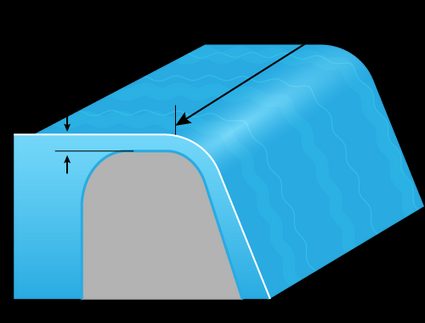Broad Crested Weir Calculator
The broad crested weir calculator helps you determine the upstream flow rate over a weir in an open channel flow. A weir is a barrier installed over rivers or outlets of reservoirs, lakes, and ponds to control the water flow and height of the water level. It is also known as a low-level dam that helps prevent flooding, monitor water levels, perform flow analysis, and measure the volumetric flow rate of the streams.
Weirs are of different types based on the barrier's geometry, such as sharp-crested, broad-crested, narrow-crested, and Ogee-shaped. Further, you can also classify the weirs based on the shape of the opening, i.e., rectangular, triangular, and trapezoidal.
The calculator and the accompanying article focus on the calculation of broad-crested weirs. Read on to understand the broad crested weir equation and how to perform weir flow calculations. You can also learn about flow through a pipe using our pipe flow calculator.
What is broad-crested weir?
When the upstream head above the crest is between 5 to 50% of the crest length, the weir acts as a broad-crested weir. This definition of broad weirs depend on the upstream head because if the approaching head is large, the thick weir can become a sharp-crested weir.
Broad-crested weirs are usually rectangular in shape and are most suitable for larger flows. The water follows the surface of the structure and flows like a waterfall after crossing the weir. You can learn more about flow rates using our flow rate calculator.

Broad-crested weir equation
The weir flow rate is the function of the coefficient of the discharge (C), upstream head (H), and length of the weir (L). The equation also depends on the cross-sectional profile. The broad crested weir equation to calculate discharge (Q) is:
The broad crested weir coefficient (C), in this case, depends on acceleration due to gravity, such that:
Using the broad-crested weir calculator
Let's determine the flow rate for a 2 m long weir and upstream head of 0.5 m.
To calculate the weir flow rate:
-
Enter the height of the stream above the crest, .
-
Fill in the length of weir, .
-
Use the acceleration due to gravity as .
-
The coefficient for a broad crested weir is:
- Using the broad crested weir calculator:
FAQs
What is broad-crested weir?
The broad crested weir is a wide barrier used to control the flow of a stream. It is often installed on the opening of reservoirs, ponds, and lakes to prevent flooding, perform flow analysis, and steady the water flow.
How do I calculate discharge over a broad-crested weir?
To calculate the discharge over a broad crested weir:
- Find the upstream head and raise it to the power of 1.5.
- Multiply the resultant by the coefficient of discharge.
- Multiply the product with the length of the weir to obtain the discharge.
What is the discharge for a 0.75 m high stream over a 5 m long broad crested weir?
The flow rate for a 0.75 m high stream over a 5 m long weir is 5.54 m³/s. Considering the coefficient of discharge as 1.705 m0.5 s-1, the flow rate, Q becomes Q = 1.705 × 5 × 0.751.5 = 5.54 m³/s.
How does a broad-crested weir work ?
The water flowing over a broad-crested weir slows down due to friction as it follows the surface of the structure continuously. The water flows over the crest, and gravity takes over, causing the flow to turn super-critical. The flow accelerates and gets thinner and the water flows like a waterfall.